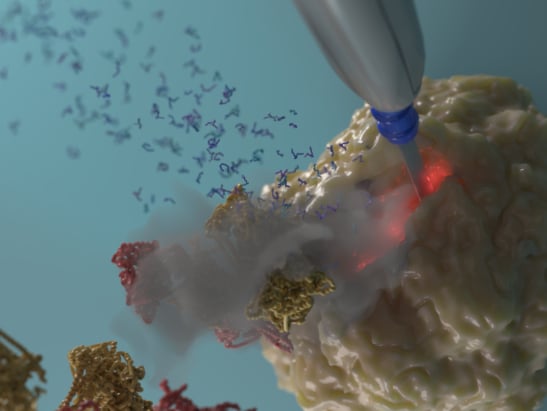Signalling and Cancer Metabolism Group
Dr George Poulogiannis’ group is investigating the role of chemical signal networks in healthy and cancerous cell growth.
Research, projects and publications in this group
Our research focus is to understand the signalling and metabolic networks that are related to cell growth and malignant transformation. We aim to explore unique metabolic nodes for novel therapeutic intervention, biomarker selection, and personalised treatment.
Dr George Poulogiannis
Group Leader:
Signalling & Cancer Metabolism
Dr George Poulogiannis is studying the signalling and metabolic processes that cause cell growth and the emergence of cancer. He has worked at many research institutions and as a member of the Joint Centre for Systems Oncology, is an academic affiliate of Imperial College London.
Researchers in this group
Dr George Poulogiannis's group have written 50 publications
Most recent new publication 5/2025
See all their publicationsBoth epidemiological and in vitro studies have shown that oncogenic transformation requires the accumulation of at least 6–12 mutational events, possibly more, a process that is facilitated by some form of genetic instability.
Recent advances in next generation sequencing have also shown that mutations in DNA repair and replication genes are present in >58% of cancer cell lines, suggesting that the genetic instability derived from these changes is an intrinsic feature of most cancers.
However, it is by no means clear whether genetic instability in itself is a phenotype that is selectable in tumour cells, or whether it is merely an epiphenomenon – a marker of some other selectable advantage conferred by loss of a DNA repair function.
The primary focus of our laboratory is to understand the functional contribution of both chromosomal and microsatellite instability in cancer cell adaptation to oxygen and nutrient deprivation. We use multi-disciplinary approaches including next-generation sequencing, high-throughput metabolomics and proteomics to gain mechanistic insights into the role of genetic instability and secondary target mutations in cancer progression and metabolic re-programming.
Our goal is to be able and classify genetically unstable tumours based on their signalling and metabolomics profiles, understand their functional consequences to pleiotropic drug resistance phenotypes and ultimately, use this information for the implementation of novel and combinatorial treatment options.
Cancer cells display unique alterations in their signalling and metabolic circuitry in order to fuel their growth and proliferation and/or adapt to conditions of oxygen and nutrient deprivation. We now have the ability to measure cellular metabolism in different genetic backgrounds and/or physiological conditions and connect specific cancer-driven mutations with their unique metabolic profiles.
Our laboratory uses high-throughput technologies including NMR- and mass spectrometry-based metabolomics, and utilizes methods to measure the basal oxygen consumption and glycolysis rates in order to reveal the metabolic dependencies of cancer-driven alterations.
We are studying the role of cancer metabolism in many aspects of tumour biology, including cell invasion and metastasis, oncogene-induced senescence and/or resistance to current treatment options. The notion of "metabolic addiction" in cancer cells opens up a new therapeutic window not only for the identification of additional targets for drug development, but also for the identification of potential biomarkers for early detection, therapeutic prevention and personalized treatment.
The research focus of the Poulogiannis lab is to understand the signalling and metabolic networks that are related to cell growth and malignant transformation. In particular, we are interested in deciphering the genetic and molecular pathways that underlie metabolic addiction of cancer cells to known biosynthetic pathways and/or drive cancer cell adaptation to oxygen and nutrient deprivation. In line with these efforts, we aim to explore unique metabolic nodes for novel therapeutic intervention, biomarker selection, and personalised treatment.
Cell homeostasis is achieved through an orchestrated balance of cell signaling interactions that dictate the likelihood of a cell to escape from normal growth restraints or be eliminated from the replicative pool, resulting in cell death.
Two of the most profound examples of human disease that are characterized by different responses in cell fate determination are those of Parkinson's disease (PD) and cancer.
Although it is hard to imagine any connection between these diseases, especially since having so distinctively different clinical outcomes, there is increasing evidence to suggest that the PD susceptibility genes are also associated with cancer. Indeed, patients with PD appear to have a much higher risk for some types of cancer, including breast cancer and malignant melanomas and lower risk for some others such as lung carcinomas and tumours of the buccal cavity.
We have previously shown that the PARK2 gene, the loss of which has been associated with the pathogenesis of autosomal recessive juvenile PD, is a novel tumour suppressor that is inactivated in more than 30% of sporadic colorectal cancers (CRCs).
PARK2 inactivation results in a dramatic acceleration of cell proliferation in CRC both in vitro and in vivo and recent high-resolution DNA copy number data rank it as the 6th most frequently deleted gene across 26 tumour types. Cancer cells acquire, in some cases, the exact same mutation in PARK2 that is found in PD patients, and rather than die or have the ability to tolerate it, they turn it into a proliferative advantage.
Previous work by Zhang et al. 2011 has shown that PARK2 is a transcriptional target of the well characterized tumour suppressor p53 that mediates it's role in glucose metabolism and the Warburg effect, yet the exact mechanism by which this gene regulates aerobic glycolysis is largely unknown, and so is its contribution in redox sensing and regulation.
Our current research focus lies on deciphering the molecular and functional basis of PARK2 inactivation in tumour progression and impaired mitochondrial function. We utilize both in vitro cell biology approaches, metabolic flux analysis and genetically engineered mouse models to understand the role of this gene in cell metabolism under conditions of distinct nutrient availability and genetic backgrounds.
 .
.


